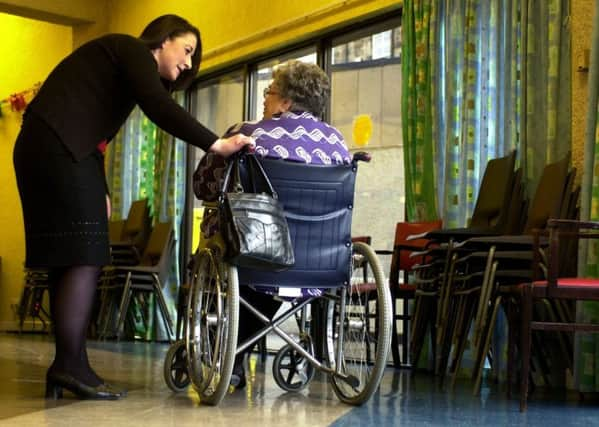Andrew Vine: Care inequality puts high price on some illnesses


Like any parents who worked hard all their lives, he and his late wife intended that their estate would go to their children and grandchildren. It won’t now, or at least not all of it, because care costs will probably swallow his savings and a large chunk of the sale of his house.
This would have distressed him terribly, and for his family, it is a mercy that he is no longer able to appreciate it.
Advertisement
Hide AdAdvertisement
Hide AdNorman, on the other hand, who has just been diagnosed with cancer, comforts himself that whatever lies ahead, his family will inherit all he has, because the first-class care he is now receiving from the NHS won’t cost him a penny.
The contrasting fates of these two old friends of mine, both in their late 70s, neatly sums up the dilemma of how Britain pays for the care of people in need.
Without intending to discriminate, we have drifted into creating a hierarchy of illness. Some are deemed worthy of the state picking up the costs of care, whilst others strip sufferers not only of their health, but of their wealth too.
Contract cancer, or any other condition requiring medical care, and the state will do its utmost to help, free of charge.
Advertisement
Hide AdAdvertisement
Hide AdBut develop a long-term condition that requires care outside a hospital, and if you have any means, you’re expected to foot the bill.
It’s an iniquity that is intensely frustrating for the families of those who have to pay. The generations now needing help in old age embody the values championed by successive governments of doing the right thing in working hard, saving and planning for retirement.
Except nobody told them that in the twilight of their lives, much of what they had would have to be spent on care instead of being passed on to the families for whom they had worked so hard.
And this is a problem that is only going to get worse. The Government’s own figures show that one in 10 people in care already have to find more than £100,000. That proportion is bound to rise, because in 20 years’ time, the number of people aged 85 or over is projected to double, thanks to advances in medicine.
Advertisement
Hide AdAdvertisement
Hide AdInevitably, that is going to place both the NHS and the social care system under additional strain, when both are already creaking.
The pressures are starkly illustrated by the fact that it is now common for two-thirds of all council budgets to be spent on providing social care.
The problems of social care, and its long-term funding, were discussed yesterday by the Housing, Communities and Local Government Select Committee.
And Health Secretary Jeremy Hunt told an audience of social workers last week that the Government’s Green Paper on the issue, due this summer, would set out options for the future.
Advertisement
Hide AdAdvertisement
Hide AdHe also said it would include proposals for a cap on costs for those paying for care, but there was no indication that the Government intends to address the iniquity that sees the NHS pick up the bill for caring for some long-term conditions but not others.
Whatever the detail of the proposals, they are going to have to be pretty radical if they are to address what is becoming a crisis.
More than 30,000 care home places have been lost over the past decade because owners have been unable to afford to keep them open with the funding provided by the state.
One consequence of this has been a huge increase in bed-blocking in hospitals, because elderly patients ready to be medically discharged, but still in need of care, have nowhere to go.
Advertisement
Hide AdAdvertisement
Hide AdThis is a dreadful mess that the Government needs to tackle urgently. It is the result of a lack of joined-up thinking that has only recently started to be addressed, with Mr Hunt being given responsibility for social care, as well as health, in January.
This was long overdue, and the benefits of linking the NHS and social care systems have been proven by a pilot project in Manchester which has drastically reduced bed-blocking.
It has also cut the number of elderly people needing to be taken to accident and emergency departments by forging closer links between care homes and GPs.
The success of the pilot points the way forward for other areas, but there still needs to be a fundamental rethink of the care system, both in terms of capacity for an ageing population, and how it is funded.
Advertisement
Hide AdAdvertisement
Hide AdSuggestions of a tax specifically to fund the NHS are gaining support across all the major political parties, but it will not begin to address Britain’s care crisis unless the money is also found to look after the country’s elderly without a disproportionate reliance on their savings.